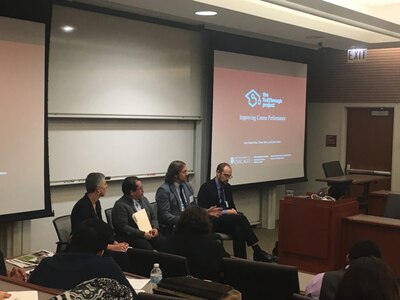If you’re a principal intent on disruption, here’s one place to start: Ban Fs.
“Fs and Ds are worthless,” Principal Juan Carlos Ocon told a group of rapt educators Thursday. The principal of Benito Juarez Community Academy in the predominantly Latino neighborhood of Pilsen spoke as part of a panel on improving student performance at a conference hosted by the University of Chicago Consortium on School Research.
The event took place during a daylong look at the consortium’s latest round of pivotal research, which draws a clear line from ninth grade performance to high school graduation.
Conferees discussed the latest data showing freshman GPAs in core classes — such as reading, math, and science — dropping a third of a point from their eighth-grade GPAs. One key finding: Failure in non-core classes, like PE, far exceeds similar eighth- grade numbers. But researchers didn’t uncover why as many Chicago freshmen fail PE as science. (Read more here.)

Joined on the panel by fellow principals Chad Adams of Roger C. Sullivan High School in Rogers Park on the North Side and Wayne Bevis of Robert Lindblom Math and Science Academy, a test-in school in West Englewood, Ocon said he took a hard position to “ban Fs from kids’ lives.”
“It actually increases rigor,” he said, explaining how the mindset of his school has shifted from punitive deadlines to encouraging learning at a student’s pace. Any high schooler who isn’t proficient in a subject by June must keep going to class until the light bulb glows, Ocon said. “Our classes do not end in June when classes end in traditional high schools — our classes extend through second week of August.”
Panelists Adams and Bevis are also “blowing up” the idea of Fs. At Adams’ school, located in an immigrant-rich neighborhood and inside which 40 some languages are spoken, Fs aren’t quite verboten — but, every five weeks, teachers have to come clean with how many Fs they give.
“Teachers didn’t like it as first, but then they started to hold each other accountable,” Adams said. I have the same kids (as you do) in your class, but, look, I gave 4 Fs versus your 54. What are you doing?”
Bevis has done away with As through Fs entirely and moved to a numeric grading system that runs 1 to 4. He’s also implemented a buildingwide revision policy, which can be controversial at some schools. After receiving a grade, students have at least two weeks to resubmit revised work and show they have improved their skills. “Some teachers go longer than two weeks, up to a semester,” he said.
Though located in very different areas of the city, each school has seen significant gains in student performance, with consistent, year-over-year rises in graduation rates and “freshman on track” percentages — that is, the percentage of freshmen who are on track to graduate as measured at the end of ninth grade, a metric developed by the University of Chicago and a key measure of success in Chicago.
The principals used the panel session to share other practices they see improving performance in their schools.
At Lindblom, for example, a revolving weekly “colloquium class” offers students extra help in a particular subject. Students must submit requests by Monday night, and with input from teachers a computer spits out their assigned special class, which can change week-to-week. “There’s a consistent understanding among teachers and students that we need to target which skills they struggle with,” Bevis said.
At Juarez, teachers spent the past year studying and recommending a set of core developmental competencies, a list that includes perseverance and relationship skills. Daily lessons are built in during an advisory period, and the staff is on board since they helped create them, Ocon said.
Adams echoed the idea of building a high-performance culture starting with his teacher corps. He’s likewise building a set of core values to express what a Sullivan High School graduate represents. When it comes to creating a learning culture, staff buy-in is essential, he said. When it comes to change, “if the teachers aren’t ready, the kids won’t be ready.”

